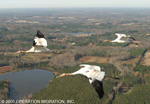Whooping
Crane Migration Update: March 31, 2006
Today's Report Includes:
- Northward Bound: HY2005 Crane-Kids Take Off! Challenge Question #5
- Navigation Notions: Challenge Question #6
- Field Notes: Tom Stehn (Western Flock) and Mark Nipper (Eastern)
- Which Crane-Kids Wear the PTTs? Discussion of CQ #4
- Timing is Everything: Discussion of CQ #3
- Live From the Platte River! Crane Cam
- Ask the Expert: Send Your Questions!
Northward Bound: HY2005 Crane-Kids Take Off!
Migration is underway for all 19 of last fall's ultralight-led chicks! Now that they've gone, calculate this:
Challenge Question #5:
"How many *days was the HY2005 flock on the Florida wintering grounds before departing on their first journey north? What is the average number of days on the wintering grounds for the 5-year history of the new Eastern flock?"To respond to this Challenge Question, please follow these instructions.
*Use the March 28 departure date for the group of 18, which was all but one of the crane-kids. For average days in previous years, see Comparing Migrations, 2001-2005.
More news on both flocks follows, but in your journals you'll want to note the weather where the cranes are coming from and headed to.
| Keep up with "your" crane on its own map during the journey north. (We'll do our best to keep maps updated. Getting every bird's location is a real challenge for the few trackers on duty.) |
In the Eastern flock, it's been a week of suspense and surprise. Chick #520 and adult #309 flew out of camp together a full day before the other 18 crane-kids. But neither #520 nor #309— buddies now migrating together—have made a successful trip north. Chick #520 was a good follower on the fall migration, but there's one break in her knowledge of the migration route. She missed 64 miles on Day 59 when she and several other birds were crated and moved from Terrell County to Cook County in Georgia. And #309 has never been back to Wisconsin because she gets lost. Now we are left to wait and wonder: Will these two make it home? Where has #309 been—and why? Find out, and also hear the audio clip with Operation Migration's Joe Duff's thoughts on crane navigation:
Then come back and send us your thoughts for. . .
Challenge Question #6:
"Do you think #309 and #520 have enough knowledge of the route to get them home? What factors will aid #309 in making a successful migration back to Wisconsin?"
To respond to this question, please follow these instructions.
Field Notes: Cranes on the Wintering Grounds--and On Migration!
|
"On
my March 29 aerial survey, there were only 19 cranes I could
not find," says Tom. How many does Tom think are migrating? In
a recent blue crab search, Tom found so few that he said:
"It would be equivalent to you having to walk 4 hours to
the
store and
then being allowed to
buy only 7 small oatmeal cookies that you would have to share with
your parents." That's bad news for he cranes, and so is one other conditon.
What is it? Tom also said, "The Lobstick cranes are some
of the first birds
to
migrate
and
traditionally
reach Wood Buffalo Park before most
other cranes." Where does their name come from? It's all inTom's
report:
Come on a photo Field Trip to Aransas! |
|
Which Crane-Kids Wear the PTTs? Discussion of Challenge Question #4
"Which 3 birds from all the HY2005 chicks would you pick to wear satellite transmitters (PTTs)? What are your reasons for each pick?”
It turns out that TWO transmitters (we goofed) were available for the ultralight chicks. Those two PTTs went to females #502 and #520. In addition, three transmitters went to the female DAR (Direct Autumn Release) chicks: #527, #528, #533. We were impressed with the picks and reasons sent by Katie and Marcus. They give us all a lot to think about. Don't miss their answers, and an expert's thoughts, here:
Timing
is Everything: Discussion of Challenge Question #3
Tom
Stehn earlier said that whoopers get rewarded for migrating at the right
time. We asked you to be alert for new information in Tom Stehn’s March
24 report to help with this question:“What
determines the best time for whooping cranes to migrate? Give statements
to support
your answer.”
“The best time for Whoopers to migrate is determined by experience, and then, natural selection helps ensure that the birds who made the best choices survive.” Marcus carefully read Tom’s March 24 report! Seventh graders from Iselin Middle School listed critical factors such as instinct and weather. All together, these answers are impressive! See more here:
 |
Do
you see the whooping crane among these sandhill cranes?
Photo Jeff Bahls |
Live From the Platte River! Crane Cam
See the amazing crane migration in real time on
the Internet. Sandhills by the thousands are taking off from the
Platte,
and two
whooping
cranes
are said to be in the mix. (Sandhill cranes are the non-endangered
cousins of whooping cranes.) What can you see?
Ask the Expert: Send Your Questions!
Once again this year, ornithologist Laura Erickson eagerly awaits your questions. It's a great opportunity to get answers from an expert!
- Submit your questions on the Web (Closes April 7)
The Next Crane Migration Update Will Be Posted on April 7, 2006.
Copyright
1997-2006 Journey
North. All Rights Reserved.
Please send all questions, comments, and suggestions to our
feedback form
![]()
![]()
![]()
![]()
![]()
![]()











